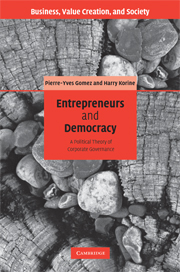Book contents
- Frontmatter
- Contents
- List of figures and tables
- Foreword
- Introduction
- Part I Establishing the ideological foundations: the contribution of liberal political philosophy
- Part II Understanding how corporate governance evolves: the contribution of history
- Introduction to Part II
- 3 Familial governance (c.1800–1920): economic enfranchisement and the founder as entrepreneur
- 4 Managerial governance (c.1920–1970): separation of powers and management as entrepreneur
- 5 Post-managerial governance (from c.1970): ownership of the large corporation reaches unprecedented mass and fragments into multiple poles
- 6 Interpreting public governance: representation and debate signify a new step towards democratization
- Conclusion to Part II
- Part III Corporate governance and performance: the contribution of economics
- Conclusion to Part III
- Epilogue
- Index
Conclusion to Part II
Published online by Cambridge University Press: 22 September 2009
- Frontmatter
- Contents
- List of figures and tables
- Foreword
- Introduction
- Part I Establishing the ideological foundations: the contribution of liberal political philosophy
- Part II Understanding how corporate governance evolves: the contribution of history
- Introduction to Part II
- 3 Familial governance (c.1800–1920): economic enfranchisement and the founder as entrepreneur
- 4 Managerial governance (c.1920–1970): separation of powers and management as entrepreneur
- 5 Post-managerial governance (from c.1970): ownership of the large corporation reaches unprecedented mass and fragments into multiple poles
- 6 Interpreting public governance: representation and debate signify a new step towards democratization
- Conclusion to Part II
- Part III Corporate governance and performance: the contribution of economics
- Conclusion to Part III
- Epilogue
- Index
Summary
Corporate governance has changed considerably over two centuries, co-evolving with the transformation of the entrepreneur and the spread of democracy. However, the underlying dialectic opposition for legitimacy between the entrepreneurial force and the liberal fragmentation of society has not changed. The resulting dynamic interplay of forces helps explain the unity of the questions asked and the diversity of responses offered over the history of corporate governance.
With this understanding we can lay to rest one of the most common errors in the field – namely that interest in corporate governance is only of relatively recent vintage, traceable to the 1930s and the work of Berle and Means, or, by some accounts, to the 1980s and the advent of modern finance, or, most preposterously of all, to 2001 and the spate of contemporary corporate scandals. This idea is obviously wrong. Who could reasonably believe that it has taken over two centuries of capitalism before people suddenly began to ask questions about the legitimacy of those who direct corporations? On the contrary, it is clear that these discussions started with the creation of modern enterprise and that criticism questioning the legitimacy of those in power over the corporation has never ceased: diverse political parties of the left and the right, individual lawmakers, philosophers, churches, and business leaders themselves have all at one point in time or another worried about who had the right to direct the corporation, on what basis directors could legitimize their authority, and by which procedures the governing could obtain acceptance from the governed.
- Type
- Chapter
- Information
- Entrepreneurs and DemocracyA Political Theory of Corporate Governance, pp. 215 - 222Publisher: Cambridge University PressPrint publication year: 2008

